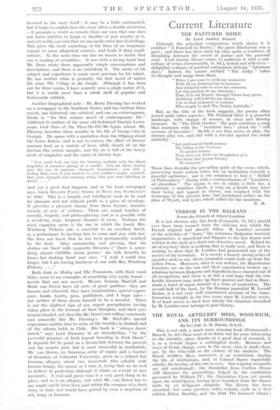Current Literature
THE PASTURED SHIRE
By Lord Justice, Blesser .,.
Although the principal ,cOmpoSition which shows it is entitled " A Farewell to Poetry," the great Blackstone was a poet ; and-there-has been-since his time quite a-tradition of friendship between the sword of justice and the pastoral reed. Lord Justice Slesser comes to maintain it with a mis- cellany of verses (Arrowsmith, 7s. Gd.), lyrical and reflective- " delightful evidence of poetical enthusiasm defying " laborious days." Indeed, the sonnet entitled " The Judge " takes its thought and image from them.
• - " When I am come to yield my testament
With all my learning lost to memory, And withered- robe to serve for cerement, Let this petition bo my threnody : That, if-in old Report, through Terms long spent, Authority still hold for, my decree, I go to final judgment in content • Who sought to spell Thy justice faithfully." .
But, as the title of the book suggests, the poems often record_ qiiite" other aspects . The Pastured'Shire peaceful landscape, with change of seasons, in clear and flowing measure. In " The Herb Garden " the poet contrives a song that .murmurs with the " merchant bees " about the " soft avenues of lavender." Beside a sea that seems at play, the rhymes ,play too, and end with a wavelet against too much austerity : " Let professorial bards amerce
The follies of the Universe At sombre leisure.
They shall not chide our thoughtless giJe
' Nor harm that joyous fantasy We treasure."
Those lines describe the -prevailing spirit of the verse, which, preserving many serious hints, has an inclination towards' a graceful optimism; .nor is one 'surprised to find a " Ballad of Philosophers " closing with a commendation of "-Laughter, ad absurdum." The region is..one in which a little inn,' a valentine, -a nameless brook, a song on -a; heath may have their being and appeal in rhyme, not touched with the technique: of-this present date, but- modulated rather on the plan of Wyatt, and lyrics which called for the musician. E. B.


































 Previous page
Previous page